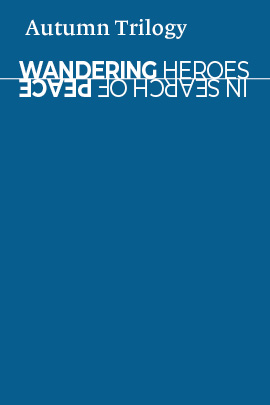Sweet Colour of the Oriental Sapphire (Purgatorio I, 13)
31st edition from June 3 to July 19
Dante’s idea of “the East” shared many traits of Byzantine Ravenna. This is a fact, not a suggestion, and traces are profusely scattered through Dante’s verses, as many distinguished scholars have shown. This East maintained a dense network of relationships with the Medieval West, trading ideas as well as goods, treaties, scientific texts, translations of the Greek classics from Arabic into Latin, travel accounts, or the tales of wayfarers, monks and pilgrims. The same East was—quite ironically—brought closer to the West by the wars of conquest and the crusades, whose battlefields became opportunities for mutual knowledge, confrontation and hybridization. And this East had its own preferred way of knowledge, to be found in the arts, and embodied in the basilicas and the mosaics. We like to think—and it would not be unlikely!—that Dante’s “sweet”, “sapphire-blue” sky was inspired by the starry vault of the mausoleum of Galla Placidia, or that the pure, fresh air that delighted the Poet’s sight and breast in Purgatory, Canto I, was the very air he breathed on our shores, his gaze fixed on the East. (More than six centuries later, another poet, Eugenio Montale, would be similarly oriented, and refer to Ravenna in his poem Dora Markus as the place “…where an ancient life / Blends into a mellow / Oriental anxiety”.)
This luminous and bright theme, chosen with a view to the approaching celebrations for the 7th centenary of Dante’s death in 2021, will be matched by a darker and more disturbing image, which marks a distance to that ancient and fabulous East: our minds and hearts will turn to the people of Syria, murdered and forced into exile, and the Roads of Friendship concert, that Riccardo Muti had conducted in the Ancient Roman Theatre at Bosra, near Damascus and Aleppo, in 2004, will be “For Syria”, and dedicated to Hevrin Khalaf. The 35-year-old Secretary General of the Future Syria Party, an activist for women’s rights and the Kurdish liberation movement, and a worker towards increasing tolerance and unity among Christians, Arabs, and Kurds, was brutally killed in an ambush on the road connecting Ras al-Ayn to Qamishli, in north-eastern Syria, in October 2019.
In our time, when daily reports constantly inform us on the damage that human neglect causes to the most valuable of our assets, the environment, we are also painfully aware that the overwhelming fascination Dante experienced and expressed in its earthly-paradise purity might be definitely and irreparably lost. Insatiable greed and wickedness made the air of Dante’s Hell unbearable, an “air of death”: can they now also poison the air, seas and rivers of our Mother Earth forever? Can they burn down our natural rainforests—imposing, cathedral-like and sacred in their majesty?
The Festival’s theme thus becomes a sort of meditation on Man’s threefold nature—divine, human and diabolical—which, once again with a reference to Dante’s vast universe, will form the thematic core of the Autumn Trilogy. After an opening entrusted to an outside-the-box étoile like Sergei Polunin, the Trilogy will continue with Mozart’s Don Giovanni and Gounod’s Faust.
As for the Festival’s XXXI edition, it will open with a XX-century milestone, Philip Glass’s Koyaanisqatsi, and close with the Italian exclusive of the spectacular Carmina Burana by La Fura dels Baus, and with a Ballet Gala in tribute to Alicia Alonso. The Festival’s ballet and dance programme features the world première of Johan Inger’s new creation as well as Opera Ballet Vlaanderen and the Hofesh Shechter Company. As for music, conductors Ivan Fischer and Valerij Gergiev will also be on the Festival’s podium. Eclecticism will be the watchword for the events featuring Vinicio Capossela, Stefano Bollani, Neri Marcorè, and the 100 Cellos led by Giovanni Sollima and Enrico Melozzi. If the basilica of Sant’Apollinare Nuovo provides a stage for Paul Hillier and his Theatre of Voices, San Vitale will host a new series of daily Vespers at 7pm. Also, the Young Artists for Dante section will return to the Franciscan cloisters, next to the Poet’s Tomb, at 11am, daily.
